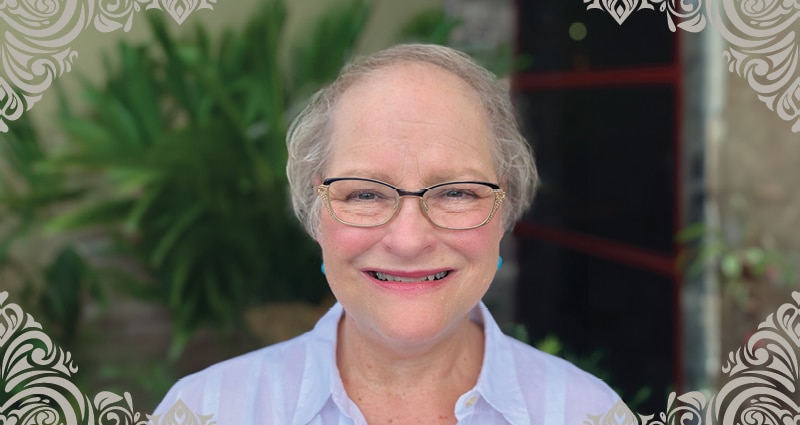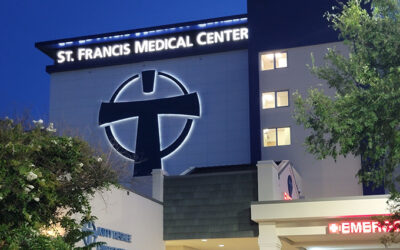In 1980, Alison Walker joined Our Lady of the Lake during a transformational time, just after the hospital had moved from its downtown location. Although she didn’t intend to stay longer than five years, Walker’s entire professional career was with the ministry, rising to senior leadership.
As one of the first female administrators who wasn’t a nurse or Sister, Walker paved the way for other women leaders over her decades-long tenure. Starting as an assistant administrator responsible for planning and agency affairs, Walker retired in 2014 as senior vice president for planning and business development, with plenty of title changes along the way.
“If you could script what a wonderful job would be for me, this would be it,” Walker says. “I had to have the balance of the theoretical, study things and the action part of doing things.”
Mentors to Learn From
When she was recruited from Tulane University after earning her master’s in health administration, Walker was willing to go wherever the best opportunity was.
“My life is a series of very good consequences,” Walker says. “It’s a God thing. Opportunities have presented themselves, and I’ve had the wherewithal to take advantage of them. It’s been what’s meant to be.”
Part of what drew Walker to Our Lady of the Lake was its beautiful, modern facility, the first in the state to have all private rooms. What convinced her it was the right place were the Franciscan Missionaries of Our Lady Sisters who sponsor the ministry.
“It was clear the Lake was just such a special place. Something was different,” she says. “I was familiar working within a faith-based organization, but it just had a different feel.”
In her career, Walker estimates she worked closely with or had relationships with 25 of the Sisters.
“As wonderful as my career was from a job perspective and the mentorship and opportunities I had, that was always framed by the relationships I had with the Sisters and the opportunity I had to learn from each and every one of them.”
Walker enjoyed many mentors during her career, including the late Robert Davidge, then CEO, who encouraged Walker to remain with the ministry, and Mother Gertrude Hennessy. “I was incredibly fortunate to have not only Bob Davidge as a mentor but also Mother Gertrude. That was one savvy lady.”
Even when she would be recruited or consider other positions, Walker remembers thinking, “That’s a good job, but it’s not better than what I have now.” Finally around her 10-year anniversary with the ministry she stopped looking elsewhere.
“I worked hard and I loved my work, but it took a lot,” she says. “I’ve never regretted it, and I’ve still been able to keep in touch with many people and stay connected.”
Where Business Meets Community Needs
“The best thing to me is that the Lake has a clear sense of what we’re about, what our mission is and what our ministry is,” Walker says. “How we live out the mission and values can look different, but the core of who we are remains the same.”
Walker says Our Lady of the Lake would always work to balance business opportunities, clinical needs and what the organization was seeing in the community. “How do we get out there and not just look at what drives business for us,” she says. “We’re here to serve the community.”
One important service to the community has been Our Lady of the Lake’s presence in North Baton Rouge, first through the opening of the Scotlandville clinic. Walker was glad to be part of bringing this longstanding wish of Mother Gertrude and Sister Brendan Mary Ronayne to fruition.
“It’s never about one person. It’s always about a big team,” Walker says. “We’ve had incredible board members, really bright, savvy businesspeople and community leaders. We’ve had really great and committed medical staff leadership, and the ceaseless hours our team members put in any time we started a new service or new program made the work possible.”
Over the years Our Lady of the Lake was tested regularly by transitions and challenges throughout Walker’s time with the organization, including responding to AIDS, the rise of managed care and HMOs, and of course, Hurricane Katrina.
Our Lady of the Lake had been exploring graduate medical education before Katrina devastated New Orleans in 2005. The ministry worked quickly to support residents in need of somewhere to work and learn.
“We had to do whatever we could to shore up existing graduate medical education in Louisiana,” Walker says. “We’ve got a good supply of physicians now, and I think we can be proud of what we’ve done.”
Remembering the Past While Moving Forward
“One of my wishes is that Our Lady of the Lake would stay connected with the community who has been important in the past,” Walker says. “I’m so excited about the 100th anniversary because it represents such a wonderful opportunity to engage with people so critical to our history and acknowledge those contributions.”




